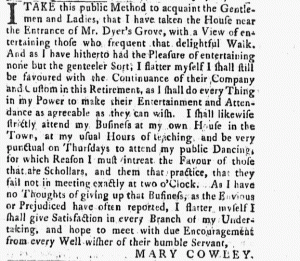What was advertised in a colonial American newspaper 250 years ago today?

“A Dancing-School is not for Diversion or Exercise only, but is designed to reform their Manners and Behaviour.”
When fall arrived in 1768, Mary Cowley placed an advertisement in the Newport Mercury to announce that she planned to “open School for the Season” on the last Wednesday in September. Advertisements for itinerant dancing masters and their schools frequently appeared in colonial newspapers, but Cowley’s notice differed in at least three significant ways. First, she was a female dancing instructor who promoted her lessons in the public prints in an era when her male counterparts dominated that occupation. Second, her advertisements spanned nearly a quarter century, unlike dancing masters who frequently moved from one town to another in search of new clients after only a couple of years. She advertised her dancing school in the Newport Mercury as early as December 1763 and as late as November 1786, though her notices that appeared during the war indicated that she operated a coffeehouse and might have taken a hiatus from giving lessons. Third, most of her advertisements were significantly longer than those placed by dancing masters. Perhaps as a woman in an occupation usually associated with men she considered it necessary to make it clear that nothing sordid occurred during her lessons.
To that end, Cowley maintained her “usual good Orders” during lessons that occurred at dancing assemblies. Her advertisements set forth a series of rules that those in attendance were expected to follow. For instance, students had to purchase tickets in advance. No one could enter without a ticket, allowing Cowley to monitor and control who attended. She informed those who arrived late “not to interrupt the Company, but wait until the next Dance is call’d.” Cowley also expressed her “hope that Gentlemen & Ladies of a Superior Rank & Age, will cheerfully condescend to conform to the Rules and Orders, that those of the younger Sot may profit by their Example.” She made it clear that her purpose and methods focused on more than just learning the right steps. Cowley offered an education in genteel comportment.
She said so quite bluntly, perhaps at the risk of losing some prospective pupils. “As I know many think the Intent of a Dancing-School is only Diversion, and are highly offended if they are reprimanded for any Rudeness of Indecency,” Cowley declared, “I would inform them such, that in my Business I have no Respect to such Persons, and shall never be afraid to remind them, That a Dancing School is not for Diversion or Exercise only, but is designed to reform their Manner and Behaviour.” This may have alienated some potential students, but Cowley did not seem particularly worried about that. She had addressed her advertisement to “the Gentlemen and Ladies who belong to my School, and all others of Distinction and Character.” This was a recurring theme in her notices. In an advertisement from December 19, 1763, Cowley stated that she was “absolutely determined, that no Lady who is not accompanied with a good Character, shall have any Admittance. Likewise, no Gentleman or Lady, who exceeds the Bounds of Decency or good Manners in one Point, or who will not be submissive to the Orders and Rules of the School, shall be countenanced here, on any Consideration.” In the October 28, 1765, edition of the Newport Mercury she had indignantly asserted, “This is not the first Time I have been obliged publicly to forbid several Ladies (who, for once more, shall be nameless) of coming to my School, who can have no Pretence, either by Acquaintance, Behaviour, Family, Fortune, or Character, to any Share of this genteel Amusement.” Such “unwelcome Guests” could “depend upon being affronted in the most public Manner” if they “presume to take those Liberties again.” After all, Cowley’s dancing school was “a chosen Place of Resort only for Gentlemen and Ladies of Family and Character.” There were some clients Cowley was not disappointed to lose.
Dancing masters often made references to their reputation and good character in their advertisements. Just a few weeks before Cowley placed her advertisement in the Newport Mercury, Peter Vianey placed a notice in the New-York Journal to address rumors that he was the same dancing master “whose Behaviour to his Scholars gave just Offence in this City some Years ago.” Even though she had the advantage of residing in Newport for several years, Cowley still defended her own reputation in her newspaper advertisements. She listed the rules to preemptively address inappropriate behavior and tamp down gossip. As a woman who ran a dancing school she exerted great effort in eliminating suspicions that her establishment was more akin to a brothel than a dancing assembly. She offered “Diversion,” but only the sort that conformed to genteel “Manners and Behaviour.”

